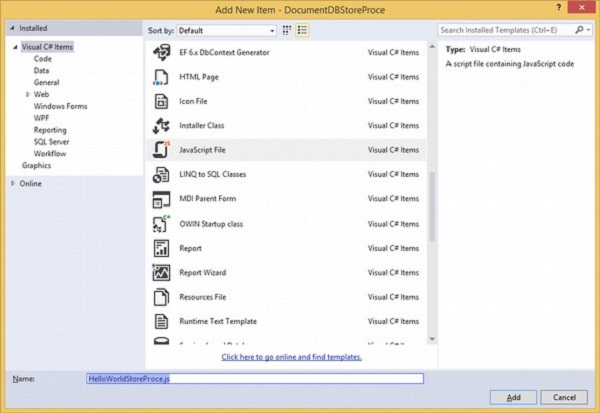DocumentDB SQL - JavaScript 集成
如今,JavaScript 无处不在,而不仅仅是在浏览器中。 DocumentDB 将 JavaScript 作为一种现代 T-SQL 来使用,并支持在数据库引擎内部原生地执行 JavaScript 逻辑的事务性执行。 DocumentDB 提供了一种编程模型,用于通过存储过程和触发器直接在集合上执行基于 JavaScript 的应用程序逻辑。
让我们看一个创建简单存储过程的示例。 以下是步骤 −
步骤 1 − 创建一个新的控制台应用程序。
第 2 步 − 从 NuGet 添加 .NET SDK。 我们在这里使用 .NET SDK,这意味着我们将编写一些 C# 代码来创建、执行然后删除我们的存储过程,但存储过程本身是用 JavaScript 编写的。
步骤 3 − 在解决方案资源管理器中右键单击该项目。
步骤 4 − 为存储过程添加一个新的 JavaScript 文件并将其命名为 HelloWorldStoreProce.js

每个存储过程只是一个 JavaScript 函数,因此我们将创建一个新函数,自然我们也会将此函数命名为 HelloWorldStoreProce。 我们是否给函数起一个名字并不重要。 DocumentDB 将仅通过我们在创建它时提供的 Id 来引用此存储过程。
function HelloWorldStoreProce() {
var context = getContext();
var response = context.getResponse();
response.setBody('Hello, and welcome to DocumentDB!');
}
存储过程所做的就是从上下文中获取响应对象并调用其setBody方法以将字符串返回给调用者。 在 C# 代码中,我们将创建存储过程,执行它,然后删除它。
存储过程的作用域是每个集合,因此我们需要集合的 SelfLink 来创建存储过程。
步骤 5 − 首先查询 myfirstdb 数据库,然后查询 MyCollection 集合。
创建存储过程就像在 DocumentDB 中创建任何其他资源一样。
private async static Task SimpleStoredProcDemo() {
var endpoint = "https://azuredocdbdemo.documents.azure.com:443/";
var masterKey =
"BBhjI0gxdVPdDbS4diTjdloJq7Fp4L5RO/StTt6UtEufDM78qM2CtBZWbyVwFPSJIm8AcfDu2O+AfV T+TYUnBQ==";
using (var client = new DocumentClient(new Uri(endpoint), masterKey)) {
// Get database
Database database = client
.CreateDatabaseQuery("SELECT * FROM c WHERE c.id = 'myfirstdb'")
.AsEnumerable()
.First();
// Get collection
DocumentCollection collection = client
.CreateDocumentCollectionQuery(database.CollectionsLink, "SELECT * FROM
c WHERE c.id = 'MyCollection'")
.AsEnumerable()
.First();
// Create stored procedure
var sprocBody = File.ReadAllText(@"..\..\HelloWorldStoreProce.js");
var sprocDefinition = new StoredProcedure {
Id = "HelloWorldStoreProce",
Body = sprocBody
};
StoredProcedure sproc = await client.
CreateStoredProcedureAsync(collection.SelfLink, sprocDefinition);
Console.WriteLine("Created stored procedure {0} ({1})",
sproc.Id, sproc.ResourceId);
// Execute stored procedure
var result = await client.ExecuteStoredProcedureAsync(sproc.SelfLink);
Console.WriteLine("Executed stored procedure; response = {0}", result.Response);
// Delete stored procedure
await client.DeleteStoredProcedureAsync(sproc.SelfLink);
Console.WriteLine("Deleted stored procedure {0} ({1})",
sproc.Id, sproc.ResourceId);
}
}
步骤 6 − 首先使用新资源的 Id 创建一个定义对象,然后调用 DocumentClient 对象的 Create 方法之一。 对于存储过程,定义包括 Id 和您想要发送到服务器的实际 JavaScript 代码。
步骤 7 − 调用File.ReadAllText从JS文件中提取存储过程代码。
步骤 8 − 将存储过程代码分配给定义对象的 body 属性。
就 DocumentDB 而言,我们在定义中指定的 Id 是存储过程的名称,无论我们实际命名 JavaScript 函数是什么。
尽管如此,在创建存储过程和其他服务器端对象时,建议我们命名 JavaScript 函数,并且这些函数名称与我们在 DocumentDB 定义中设置的 Id 相匹配。
步骤 9 − 调用 CreateStoredProcedureAsync,传入 MyCollection 集合的 SelfLink 和存储过程定义。 这将创建存储过程以及 DocumentDB 分配给它的 ResourceId。
步骤 10 − 调用存储过程。 ExecuteStoredProcedureAsync 采用您设置为存储过程返回值的预期数据类型的类型参数,如果您希望返回动态对象,则可以将其简单地指定为对象。 这是一个其属性将在运行时绑定的对象。
在此示例中,我们知道存储过程只是返回一个字符串,因此我们调用 ExecuteStoredProcedureAsync
以下是Program.cs文件的完整实现。
using Microsoft.Azure.Documents;
using Microsoft.Azure.Documents.Client;
using Microsoft.Azure.Documents.Linq;
using System;
using System.Collections.Generic;
using System.Diagnostics;
using System.IO;
using System.Linq;
using System.Text;
using System.Threading.Tasks;
namespace DocumentDBStoreProce {
class Program {
private static void Main(string[] args) {
Task.Run(async () => {
await SimpleStoredProcDemo();
}).Wait();
}
private async static Task SimpleStoredProcDemo() {
var endpoint = "https://azuredocdbdemo.documents.azure.com:443/";
var masterKey =
"BBhjI0gxdVPdDbS4diTjdloJq7Fp4L5RO/StTt6UtEufDM78qM2CtBZWbyVwFPSJIm8AcfDu2O+AfV T+TYUnBQ==";
using (var client = new DocumentClient(new Uri(endpoint), masterKey)) {
// Get database
Database database = client
.CreateDatabaseQuery("SELECT * FROM c WHERE c.id = 'myfirstdb'")
.AsEnumerable()
.First();
// Get collection
DocumentCollection collection = client
.CreateDocumentCollectionQuery(database.CollectionsLink,
"SELECT * FROM c WHERE c.id = 'MyCollection'")
.AsEnumerable()
.First();
// Create stored procedure
var sprocBody = File.ReadAllText(@"..\..\HelloWorldStoreProce.js");
var sprocDefinition = new StoredProcedure {
Id = "HelloWorldStoreProce",
Body = sprocBody
};
StoredProcedure sproc = await client
.CreateStoredProcedureAsync(collection.SelfLink, sprocDefinition);
Console.WriteLine("Created stored procedure {0} ({1})", sproc
.Id, sproc.ResourceId);
// Execute stored procedure
var result = await client
.ExecuteStoredProcedureAsync<string>(sproc.SelfLink);
Console.WriteLine("Executed stored procedure; response = {0}",
result.Response);
// Delete stored procedure
await client.DeleteStoredProcedureAsync(sproc.SelfLink);
Console.WriteLine("Deleted stored procedure {0} ({1})",
sproc.Id, sproc.ResourceId);
}
}
}
}
执行上述代码时,会产生以下输出。
Created stored procedure HelloWorldStoreProce (Ic8LAMEUVgACAAAAAAAAgA==) Executed stored procedure; response = Hello, and welcome to DocumentDB!
如上面的输出所示,响应属性具有"Hello, andwelcome to DocumentDB!" 由我们的存储过程返回。


